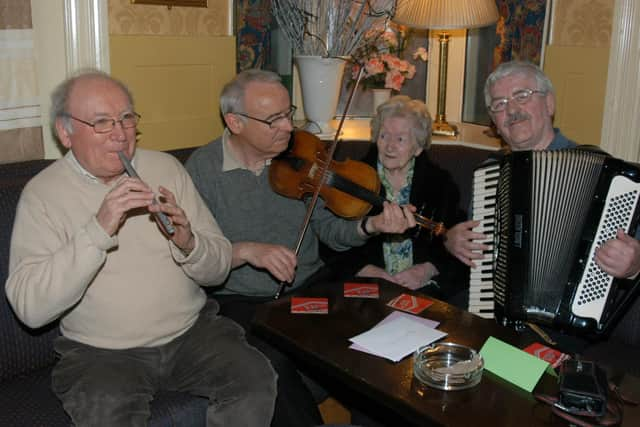Derry musician Risteard Mac Gabhann releases Great Irish Songbook – Claisceadal cois Baile
and live on Freeview channel 276
‘Claisceadal cois Baile’, featuring more than 120 songs, all with translations and footnotes, and some with Scots Gaelic renditions too, has already been described as the ‘Great Irish Songbook’.
The book is published by Colmcille Press, with the support of the Bryson Foundation and the Ultach Trust, and is available in bookshops across the island. Recorded versions of all the songs to accompany the text are available online from the Cultúrlann Uí Chanáin website.
Advertisement
Hide AdAdvertisement
Hide AdRisteard, 84, has spent seven decades promoting Irish language and culture, not only in his native Derry, but also nationally and internationally.


At St. Columb’s College, Mac Gabhann was a contemporary of Seamus Heaney, who remembered him warmly in the poem ‘The Gaeltacht’. He was also a great friend of Seamus Deane, later delivering the citation for Deane’s Alumnus Illustrissimus award (2009).
As a student at Queen’s he acted with An Cumann Gaelach, winning national Oireachtas awards - and he then put his talent to use on stage with An Cumann Drámaíocht Chraobh Sheáin Uí Dhubhláin, Cumann Cholmcille and Faces of Ireland, before moving into other media.
The broadcaster Joe Mahon, who produced the ground-breaking Irish-language drama series Seanchaí for the BBC and RTÉ, explains: “Dick is very much responsible for instigating and popularising the use of Irish on TV in the North. While I wrote the basic stories for Seanchaí in English, Dick’s very elegant translations are what attracted Irish-speakers to the series.
Advertisement
Hide AdAdvertisement
Hide Ad“He would even sit in on recordings for the voiceovers, directing the narration - and advising on the pronunciations of irregular words. He was always stretching the vocabulary, even of native speakers.
"There was one instance when our narrator, an actor from the Gaeltacht, would have been happy enough to use the word “stalactite” in a story which featured a cave. But he smiled in appreciation when Dick instead suggested a rarely used expression, ‘ard-coinnle’ or high candle, a far more poetic and descriptive solution.
“He was a major creative contributor to Seanchaí and other Irish language TV programmes - and was invariably a reliable consultant, not only with regard to Irish language topics, but also with regard to Irish history, toponymy, genealogy and mythology - he is a real polymath.”
A life-long scholar, Mac Gabhann completed a Masters in Applied Linguistics at the University of Essex and is still highly regarded in linguistic circles in this country and beyond.
Advertisement
Hide AdAdvertisement
Hide AdHe began his career in education as a language teacher in Castlederg before becoming the first Irish language lecturer at NUU in Coleraine where he remained for six years.
He had always been interested in adult education, and in working back in Derry, so he seized the opportunity of becoming a lecturer at Magee Institute of Continuing Education in the early 1970s.
A hugely-skilled accordion player and singer, specialising in slow airs, he organised the city’s first Irish language choir, Cór an Ghrianán.
And with his fellow musician Paddy Meenan, he won awards for compositions and performance at national level. He was always keeping the candle lit - and for decades he ran a weekly traditional Irish session at different venues across the city.
Advertisement
Hide AdAdvertisement
Hide AdHis family would tease him about his practising, his wife Joan once asking him: “What’s the difference between an onion and an accordion? Everybody cries when you cut an onion in half …”
But they never missed a concert, and Joan and his three daughters, Ciara, Áine and Treasa, have remained his biggest fans and champions.
Retirement from the university made little difference to Mac Gabhann’s life. His mission as a language activist continued - as did his work with myriad of groups such as the Ultach Trust, Conradh na Gaeilge, An Gaeláras and Cultúrlann Uí Chanáin.
He has always been a prodigious publisher. His multi-volume Irish-language course, Tús Maith, published through his own company Ogmios (the Celtic god of eloquence), sits on bookshelves across the country. He has also written and published quiz books and joke books in Irish.
Advertisement
Hide AdAdvertisement
Hide AdWith the development of the Derry Cultúrlann, Mac Gabhann began running a class on Irish song-writing - Claisceadal. He took a song every week and wrote about its provenance, history and origin - providing notes for his students in both English and Irish. No less an authority than Brian Friel avidly sought out the notes - Friel himself had been a noted Feis singer as a youth.
Claisceadal quickly garnered a very strong reputation - locally and then nationally, so in recent years Mac Gabhann decided to compile the songs into one volume and pen a superlative introduction contextualising the collection.
Alongside this, he engaged a team of professional musicians to provide the definitive versions of the original works, under his direction.
Joe Mahon concludes: “Besides being a dear friend, Risteard is also my first port of call for information on nearly any subject under the sun. He is a real fount of knowledge.
Advertisement
Hide AdAdvertisement
Hide Ad"He has always been a tireless promoter of Irish language and culture but he’s never done much to promote himself - he has always remained incredibly modest about his achievements.”
The late Brian Friel, praising the collection of songs that form the basis of the book, stated: “It’s a great accomplishment – smartly executed, abundantly clear and lucid, skilfully laid out, all in all a splendid piece of work...I liked particularly the notes on the various songs – they give the pieces a most valuable provenance. Of course, I remember the songs from away back but never really knew their context.”
